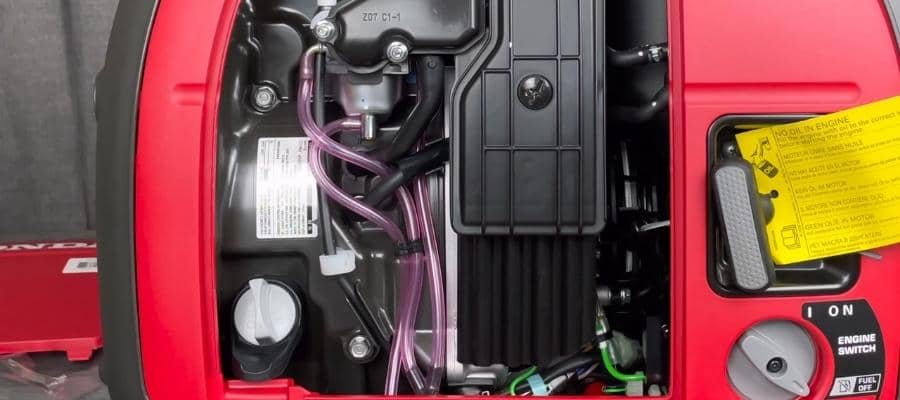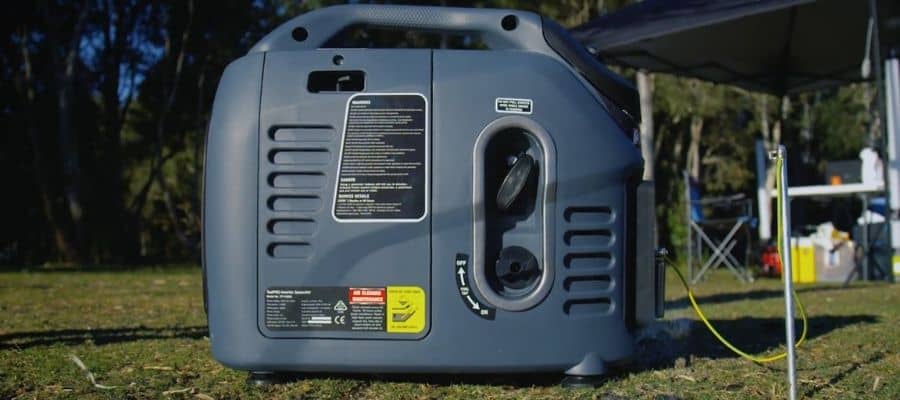
There are a lot of things to think about when buying a portable generator, whether you’re getting ready for an emergency, need to power a job site, or want to use it for fun.
To help you sort through the many options, we’ve put together a list of the things that our expert team looks for when looking for a new one.
What Should You Look for in a Generator?
Different kinds of generators
You can choose from different kinds of generators. Home generators are always there, can run on natural gas or propane, and turn on by themselves when the power goes out.
Depending on how big it is, a generator can be carried and comes in many different sizes. Some should be left on your property as a backup power source, while others should be taken to the tailgate party.
Indoor generators, also called portable power stations, are the only option for people who live in apartments and can’t safely run a generator outside.
Fuel Type
The ones that use gas are the most common. Fuel is easy to find, except when there is panic before and after big hurricanes. If you want to spend more money, diesel generators use fuel more efficiently. You will also get rid of the stuck carburetor, which always seems to get stuck when you need it the least. If you want a whole-house generator, diesel is a good choice. Diesel is sometimes harder to find than gasoline.
A propane generators or dual fuel generators are another alternative.
It’s a good choice if you want to use a fuel that’s better for the environment and don’t mind that it’s a little more complicated.
Inside generators that are powered by batteries can run quietly, are good for the environment, and can be charged by solar panels. But they are expensive, take a long time to charge, and sometimes don’t have enough power.
Power surges and outlets
Before you buy a generator, you should figure out what size will work best for your needs. That means you’ll have to figure out how much power you’ll need. Even though your refrigerator may only need 700 watts of power to run, what happens when it needs 2100 watts of power to start? Make sure you know how many watts you’ll need to start up and run the equipment you want to connect to the generator.
The other part of the question is what kind of outlets you need. Most small inverter generators have two 120V AC outlets and maybe two USB ports. When you reach 4000 watts, you’ll see more 120V outlets and 240V plugs. You’ll need a 240V plug if you want an electrician to connect your generator directly to your panel. If you’re going to use your generator outside, make sure it has outlets that are protected by GFCI.
(THD)
If you want to run sensitive electronics like laptops or lab equipment, you need to know what the waveform looks like. Total harmonic distortion should usually be less than 6% to keep electrical circuits from getting damaged. It is a voltage level that is more stable and predictable. It is often called “clean power” or “pure sine wave.”
Pure sine wave generators cost more and, with few exceptions, are usually only found in lower-wattage models.
Not all battery inverters have low THD, by the way. Some make waves that are square. If you know you need clean power, find out what the rules are.
Occasional or Regular Use
Most generators come with a warranty that lasts for a few years. Any well-known brand can be used in an emergency or for fun.
If you have a team that needs a generator almost every day, you should look for one with a real commercial engine. Not only will it fit better, but you’ll probably also get a warranty that lasts a lot longer than a year. Most of the time, these are more expensive, which is an obvious downside.
Noise Level
A silent design is possible for smaller generators. There are some that aren’t as loud as others. If you are tailgating or camping in a place where generators are allowed, your neighbors will enjoy it. When you get to the 4500 watt class, there isn’t much in the “less noise” class. One thing to think about is where the fuel comes from. Diesel engines make more noise than gas engines.
Fuel Tank & Runtime
If you have a larger fuel tank you can go longer. That’s obvious. Most generators can run for up to 8 hours at 50% load on one tank of fuel. If you use less power, you’ll run longer. If you use more power, the fuel will run out faster. It will get heavier though when the gas tank is full. There are also gas tanks and tanks made of plastic. Both have their good points and bad points. Plastic is good because it doesn’t rust or corrode.
Manual or Electric Start
If you like to pull a rope to start an engine, don’t use an electronic start. Electric start engines are a great choice if you can pay the extra cost. Lead-acid batteries, like the ones in cars, are still used in most portable generators. There are some with lithium-ion batteries. Before you use the battery, make sure it is fully charged. Most generators will work fine if the charging point is left plugged in when they are not being used.
Electronic Fuel Injection (EFI)
Having electronic fuel injection is a great thing. No longer do cars need carburetors. Even if you don’t take care of it, you could still have problems, but none of them would be caused by a clogged carburetor. In the winter, your generator will be easy to start.
Detection of carbon monoxide
Carbon monoxide (CO) detectors are built into generators by more than one company. Honda wants to use it on all of their products. If there is too much carbon monoxide near the engine, these can be used to shut it down. They work better than the ones you put in your home to keep you from getting sick or dying from CO. The trend in the industry seems to be toward putting this feature in newer models.
Hook Bar
If you buy a portable generator for a business or factory, you will probably have to move it to a higher floor at some point. A lift hook bar can be a big help that can save you a lot of time and work.
Wheel Kit
Even though generators are big and heavy, not every one of them comes with a wheel kit. Before you buy one, check twice because some stores will make you buy it separately. There are generators with two wheels and generators with four wheels. You can buy aftermarket generator dolly kits to add wheels to a model that doesn’t have them.
In summary
Size and Power Output: When shopping for a generator, the size and power output are two of the most important things to think about. The generator’s overall power output will depend on its size, and the number of appliances and devices it can power at the same time will depend on how much power it can put out. When choosing the size of a generator, think about how much power you’ll need at any one time and how many appliances and devices you’ll be running off of it.
Portability and mobility are important things to think about when buying a generator, especially if you want to use it for things like camping, tailgating, or construction work outside. Portable generators are made to be easily moved from one place to another, while stationary generators are made to be set up in one place. When choosing a generator that’s easy to move, think about how much it weighs and whether or not it has wheels and handles.
Price and Budget: The price of a generator depends a lot on its size, how much power it puts out, and what features it has. When making a budget, you should think about how much the generator itself will cost, as well as how much fuel, maintenance, and accessories will cost. A more expensive generator may have more features and capabilities, but it’s important to choose a generator that fits your budget while still giving you the power you need.
Reputation and dependability of the brand: The reputation and dependability of a generator can have a big effect on how well it works and how long it lasts. Choose a reliable brand that has a history of making high-quality generators, and look into the brand’s customer service and support options in case you need help in the future.
Warranty and Guarantee: Most generator makers offer a warranty or guarantee on their products, so it’s important to know the terms of the warranty before buying a generator. The length of the warranty can vary. Some only last a few months, while others may cover the generator’s entire life. Make sure to keep all receipts, manuals, and warranty information in a safe place so that you can use the warranty if you need to.
Extra Features and Accessories: Generators can come with a variety of extra features and accessories that make them easier to use and more flexible. USB ports, the ability to work in parallel, automatic voltage regulation, and remote start are some of the most common features. Think about the extra features you need and choose a generator that has them or can be easily modified with the right accessories.
Maintenance and Upkeep Needs: A generator needs regular maintenance and upkeep to make sure it works well and lasts as long as possible. When choosing a generator model, think about how often and how much it will cost to change the oil, replace the air filter, and do other regular maintenance tasks.
Energy Efficiency and Fuel Efficiency: A generator’s energy efficiency and fuel efficiency can have a big effect on how much it costs to run and how it affects the environment as a whole. When choosing a generator, think about how much fuel it uses and how much pollution it puts out. If you want to save money and have less of an impact on the environment, choose a generator that uses less energy and fuel.
Concerns about the environment and emissions: Generators can release gases that are bad for the environment, so it’s important to choose one that doesn’t do that. Think about the generator’s emissions when choosing a model, and choose one that meets the most recent standards and rules for emissions.
Options for Storing and Moving: When your generator isn’t in use, it’s important to store and move it in the right way to keep it from getting damaged and to make sure it lasts as long as possible. Think about how you can store and move your generator, including its size, weight, and whether or not it has handles and wheels. Choose a generator that is easy to move and store, and if you need to, spend money on protective covers and storage containers.
Review and Ratings from Customers:
Lastly, when choosing a generator, don’t forget to look at customer reviews and ratings. Customer reviews can tell you a lot about how well and reliably a generator works, as well as any problems that customers have had with it. Before you buy a generator, you should read a variety of customer reviews to get a good idea of its strengths and weaknesses.
By thinking about these things, you’ll be able to choose a generator that fits your needs and requirements and protects your investment at the same time. If you do your research and buy a good generator, you’ll have reliable power for years to come.



